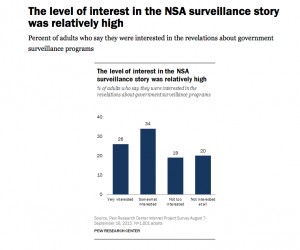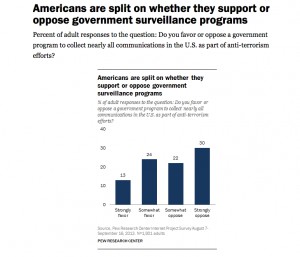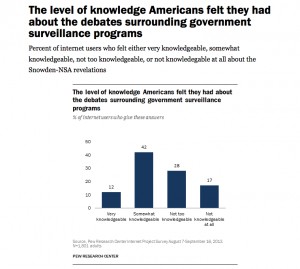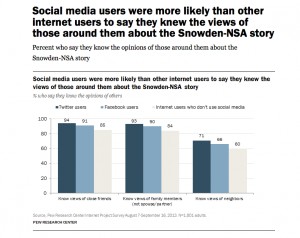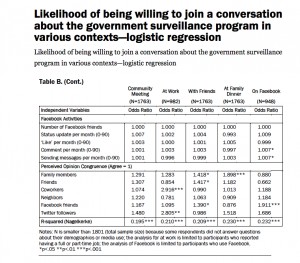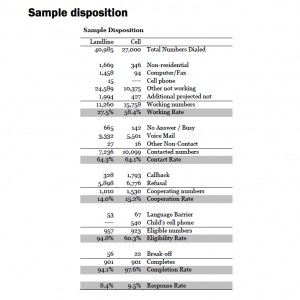Social Media and the ‘Spiral of Silence’
A major insight into human behavior from pre-internet era studies of communication is the tendency of people not to speak up about policy issues in public—or among their family, friends, and work colleagues—when they believe their own point of view is not widely shared.
 This tendency is called the “spiral of silence”. Some social media creators and supporters have hoped that social media platforms like Facebook and Twitter might produce different enough discussion venues that those with minority views might feel freer to express their opinions, thus broadening public discourse and adding new perspectives to everyday discussion of political issues.
This tendency is called the “spiral of silence”. Some social media creators and supporters have hoped that social media platforms like Facebook and Twitter might produce different enough discussion venues that those with minority views might feel freer to express their opinions, thus broadening public discourse and adding new perspectives to everyday discussion of political issues.
We set out to study this by conducting a survey of 1,801 adults. It focused on one important public issue: Edward Snowden’s 2013 revelations of widespread government surveillance of Americans’ phone and email records. We selected this issue because other surveys by the Pew Research Center at the time we were fielding this poll showed that Americans were divided over whether the NSA contractor’s leaks about surveillance were justified and whether the surveillance policy itself was a good or bad idea. For instance, Pew Research found in one survey that 44% say the release of classified information harms the public interest while 49% said it serves the public interest.
The survey reported in this report sought people’s opinions about the Snowden leaks, their willingness to talk about the revelations in various in-person and online settings, and their perceptions of the views of those around them in a variety of online and off-line contexts.
This survey’s findings produced several major insights:
- Social media did not provide an alternative discussion platform for those who were not willing to discuss the Snowden-NSA story. Of the 14% of Americans unwilling to discu
- People were less willing to discuss the Snowden-NSA story in social media than they were in person. 86% of Americans were willing to have an in-person conversation about the surveillance program, but just 42% of Facebook and Twitter users were willing to post about it on those platforms.
- ss the Snowden-NSA story in person with others, only 0.3% were willing to post about it on social media.
- In both personal settings and online settings, people were more willing to share their views if they thought their audience agreed with them. For instance, at work, those who felt their coworkers agreed with their opinion were about three times more likely to say they would join a workplace conversation about the Snowden-NSA situation.
- Previous ‘spiral of silence’ findings as to people’s willingness to speak up in various settings also apply to social media users. Those who use Facebook were more willing to share their views if they thought their followers agreed with them. If a person felt that people in their Facebook network agreed with their opinion about the Snowden-NSA issue, they were about twice as likely to join a discussion on Facebook about this issue.
- Facebook and Twitter users were also less likely to share their opinions in many face-to-face settings. This was especially true if they did not feel that their Facebook friends or Twitter followers agreed with their point of view. For instance, the average Facebook user (someone who uses the site a few times per day) was half as likely as other people to say they would be willing to voice their opinion with friends at a restaurant. If they felt that their online Facebook network agreed with their views on this issue, their willingness to speak out in a face-to-face discussion with friends was higher, although they were still only 0.74 times as likely to voice their opinion as other people.
Overall, the findings indicate that in the Snowden case, social media did not provide new forums for those who might otherwise remain silent to express their opinions and debate issues. Further, if people thought their friends and followers in social media disagreed with them, they were less likely to say they would state their views on the Snowden-NSA story online and in other contexts, such as gatherings of friends, neighbors, or co-workers. This suggests a spiral of silence might spill over from online contexts to in-person contexts, though our data cannot definitively demonstrate this causation. It also might mean that the broad awareness social media users have of their networks might make them more hesitant to speak up because they are especially tuned into the opinions of those around them.
A rundown of the key survey findings:
People reported being less willing to discuss the Snowden-NSA story in social media than they were in person—and social media did not provide an alternative outlet for those reluctant to discuss the issues in person.
Fully 86% of Americans reported in the Pew Research survey they were “very” or “somewhat” willing to have a conversation about the government’s surveillance program in at least one of the physical settings we queried —at a public meeting, at a family dinner, at a restaurant with friends, or at work. Yet, only 42% of those who use Facebook or Twitter were willing to discuss these same issues through social media.
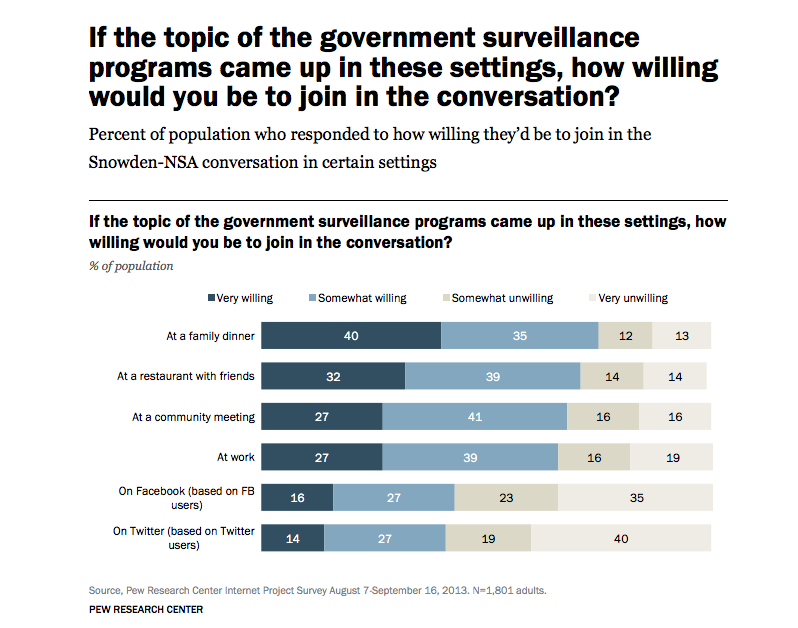
Of the 14% of Americans who were not willing to discuss this issue in person, almost none (0.3%) said they were willing to have a conversation about this issue through social media. This challenges the notion that social media spaces might be considered useful venues for people sharing views they would not otherwise express when they are in the physical presence of others.
Not only were social media sites not an alternative forum for discussion, social media users were less willing to share their opinions in face-to-face settings.
We also did statistical modeling allowing us to more fully understand the findings by controlling for such things as gender, age, education levels, race, and marital status—all of which are related to whether people use social media and how they use it. That modeling allowed us to calculate how likely people were to be willing to express their views in these differing settings holding other things constant.
The results of our analyses show that, even holding other factors such as age constant, social media users are less likely than others to say they would join a discussion about the Snowden-NSA revelations.
- The typical Facebook user—someone who logs onto the site a few times per day—is half as likely to be willing to have a discussion about the Snowden-NSA issues at a physical public meeting as a non-Facebook user.
- Similarly, the typical Twitter user—someone who uses the site a few times per day—is 0.24 times less likely to be willing to share their opinions in the workplace as an internet user who does not use Twitter.
In both offline and online settings, people said they were more willing to share their views on the Snowden-NSA revelations if they thought their audience agreed with them.
Previous research has shown that when people decide whether to speak out about an issue, they rely on reference groups—friendships and community ties—to weigh their opinion relative to their peers. In the survey, we asked respondents about their sense of whether different groups of people in their lives agreed or disagreed with their positions on the Snowden leaks. There was some notable variance between those who feel they know the views of their peers and those who do not know what others think. Generally, the more socially close people were—e.g. spouses or family members—the more likely it was that the respondents felt their views matched.
Axarhöfði 14,
110 Reykjavik, Iceland


